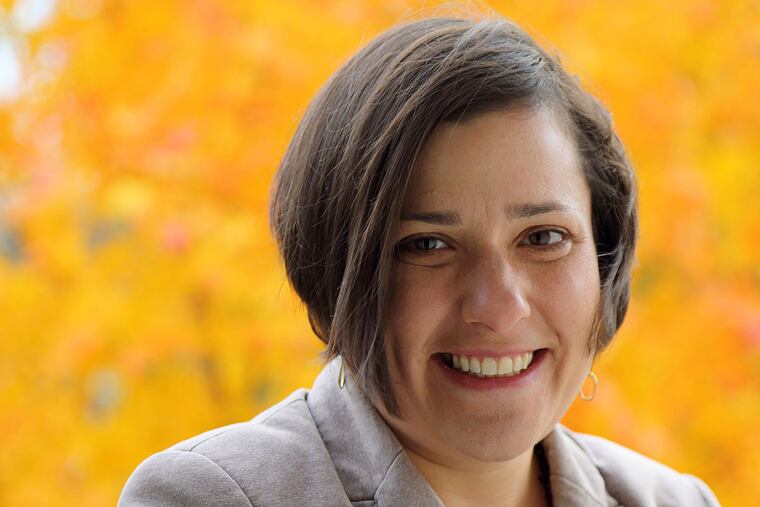New prof brings millions to Temple

Since education policy professor Sara Goldrick-Rab arrived at Temple University eight months ago, she's brought in two large grants, totaling more than $6 million for research on making college more affordable.
They include a nearly $4 million grant, announced Monday, under which she will lead a team researching the effectiveness of "completion grants" aimed at preventing needy college seniors from dropping out. Goldrick-Rab is partnering with the national Association of Public and Land-grant Universities to implement the U.S. Department of Education research grant.
She also received a $2.2 million grant from the Institute of Education Sciences to study whether giving students more information and advising on financial aid helps them apply for it and meet requirements to keep it.
Few Temple professors have multiple research grants of more than a million, said Michele Masucci, Temple's vice president for research. Of Temple's 2,205 full-time faculty, 119 have at least one award at $1 million or more, representing more than half of award dollars, she said.
"She has a very significant grant portfolio for us," Masucci said.
And in Goldrick-Rab's case, the research is on an issue that Temple has embraced — college affordability — and a major reason why the university recruited her, Masucci said.
"Everyone can appreciate how important that is," Masucci said.
Goldrick-Rab came to Temple from the University of Wisconsin at Madison, where she started and led a research lab that delved into issues such as homelessness on campus and other barriers to affording college. She said she had tried many times to secure a federal education department grant while in Wisconsin but never was successful.
"The fact that I'm now at an urban serving university, I know it made me, as an evaluator of that project, more attractive, and that's one of the reasons I came here," Goldrick-Rab, 40, said Friday.
In Wisconsin, Goldrick-Rab — who has been ranked by Education Week as the nation's 10th-most influential scholar on educational policy and practice — had developed a national reputation as a social media firebrand, once tweeting that Wisconsin Gov. Scott Walker was a "fascist" for wanting to weaken tenure protections.
At Temple, which is in a city more in line with her politics, she's found much smoother sailing.
When she met Gov. Wolf, a Democrat, she said he told her: "I'm not like your old governor."
Even when Temple ousted its provost and president in less than a month last summer, the rest of Temple's administration and faculty never lost focus, she said.
"That steadiness is so calming," said Goldrick-Rab, who caught flak at her former university for some of her tweets. "It lets you focus on your work."
Goldrick-Rab, a Fairfax, Va., native with a bachelor's in sociology from George Washington University and a master's and doctorate from the University of Pennsylvania, has been on a national tour promoting her new book, Paying the Price: College Costs, Financial Aid, and the Betrayal of the American Dream, which came out in September.
She's also preparing to open a center on college affordability at Temple in September 2018. Because her plate has been full, she is not yet teaching. She'll begin with one class in the fall.
For the completion-grant project, Goldrick-Rab will work with universities already experimenting with completion grants. Awards of $500 to $1,500 will be given to college seniors in good academic standing who need a little help paying tuition so they can graduate.
The research money will not be used for the grants. The schools in the study must pledge to fund the completion grants from their own resources for several years.
Temple is not part of the study group, Goldrick-Rab said, but she already has talked to president Richard M. Englert about starting a completion-grant program at Temple if initial research shows promise.
Goldrick-Rab will evaluate the effectiveness of the programs at each institution and then help develop the most successful model with the hopes of having it replicated at other universities, which could help improve graduation rates.
"We know that far too many students who are on track to graduate drop out of school simply because they don't have the necessary financial resources," Goldrick-Rab said. "That's bad for both the student and the institution."
Nearly 15 percent of students who have completed three quarters of their required credits for graduation drop out, often because of money. Completion grants represent a low-cost way of boosting graduation rates, she said.
Universities participating in the initial phase of the five-year study include Arizona State, Florida International, Kent State, the University of North Carolina-Charlotte, the non-Columbus campuses of Ohio State, Virginia Commonwealth University, Indiana University-Purdue University Indianapolis, and Georgia State.
Some of the schools already have found promising results with their programs, Goldrick-Rab said. At IUPUI, students who got the grants were 44 percent more likely to complete their degree within a year than their counterparts who didn't get help.